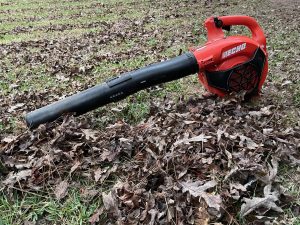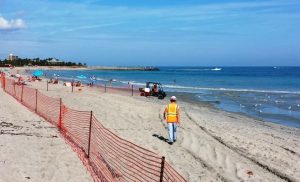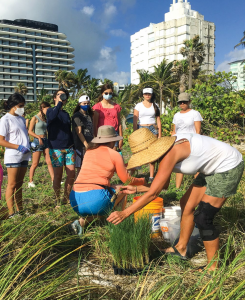Plus, poor grades on coastline protection
 A move in the Florida Legislature to block gas-powered leaf-blower bans statewide, Singer Island rebuilds again after a $2.5 million dune restoration is washed away, and a non-profit gives Florida a “D-“ grade in coastal management. It’s all in this week’s Environmental and Engineering Digest.
A move in the Florida Legislature to block gas-powered leaf-blower bans statewide, Singer Island rebuilds again after a $2.5 million dune restoration is washed away, and a non-profit gives Florida a “D-“ grade in coastal management. It’s all in this week’s Environmental and Engineering Digest.
 Leaf-Blower Bans: The legislature placed in the state budget specified language called “proviso” language on page 302, line 1864, to block leaf blower bans that have been discussed in some Florida cities and implemented in others, part of a national trend. Specifically in neighborhoods near Miami, including Pinecrest and Miami Beach, bans on gasoline-powered blowers have gone into effect to curb noise pollution and reduce harmful emissions. Proponents say the particulate matter and volatile compounds in the emissions add to the effects of greenhouse gasses, as we shared in our November newsletter. The budget item and its associated proviso include funding for a state study to compare the life-cycle of the less expensive gas-powered leaf blower to its more expensive battery and electric counterpart. If the Governor does not veto this specific item, bans in these South Florida cities would be nullified and measures underway in other towns would be halted.
Leaf-Blower Bans: The legislature placed in the state budget specified language called “proviso” language on page 302, line 1864, to block leaf blower bans that have been discussed in some Florida cities and implemented in others, part of a national trend. Specifically in neighborhoods near Miami, including Pinecrest and Miami Beach, bans on gasoline-powered blowers have gone into effect to curb noise pollution and reduce harmful emissions. Proponents say the particulate matter and volatile compounds in the emissions add to the effects of greenhouse gasses, as we shared in our November newsletter. The budget item and its associated proviso include funding for a state study to compare the life-cycle of the less expensive gas-powered leaf blower to its more expensive battery and electric counterpart. If the Governor does not veto this specific item, bans in these South Florida cities would be nullified and measures underway in other towns would be halted.

Beach renourishment in Palm Beach County
Dune Restoration: Singer Island’s dunes are in dire straits – part of the up to 70% of the 47-mile coastline of Palm Beach County that is now considered critically eroded after a terrible year of windstorms and strong tides. This destruction comes shortly after 20,000 tons of sand were deposited on the beach as a part of a $2.5 million restoration project, which has largely been undone. A further $2 million is expected to be spent sending truckloads of sand down certain stretches of public beach accesses to try and maintain protection of the shoreline. Andy Studt, who oversees the county’s dune restoration, told the Palm Beach Post that restoration projects now number 15, at a cost of more than $18 million. But the current damage is unprecedented – “we did work last year, never expecting to have to do more this year,” said Studt. Despite the ongoing erosion, Palm Beach County, as other Florida coastal counties, continue to invest in beach renourishment and dune protection to protect residential and commercial properties and bolster beach tourism.

Volunteers planting dune grass in Florida. Courtesy, Surfrider Foundation
Failing Coastal Management: The Surfrider Foundation, an environmental non-profit, gave Florida a “D-“ in its 2023 State of the Beach Report, claiming the Sunshine State “took regressive steps to protect these treasured coastlines” in the past year. The group focuses on water quality and beach preservation across the U.S. and offers insight on coastal resources in preparation for rising sea-levels through their reports. Each state gets a score in four categories: coastal armoring, development, sea-level rise, and sediment management on a scale from “Good” to “Bad.” Florida only scored an “OK” in sediment management and “Bad” for all others on its report card. Many state officials have begun to question the report’s conclusions and claims, in response saying the report isn’t accounting for the wide variety of coasts across Florida that necessitate different approaches to coastal resiliency.
LMA Newsletter of 3-11-24

